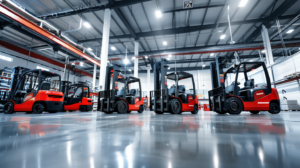Introduction: The Growing Demand for Rough Terrain Forklifts
Rough terrain forklifts are essential for industries where traditional forklifts simply can’t handle the job. Whether it’s moving building materials on a muddy construction site, transporting heavy loads across uneven farmland, or handling timber in remote lumberyards, these machines are built for the toughest conditions.
Over the past decade, the global market for rough terrain forklifts has grown steadily. Infrastructure development, agricultural mechanization, and mining expansion in emerging economies are fueling demand. With more buyers looking for cost-effective, reliable, and durable equipment, China has quickly risen as one of the most important production hubs.
However, while buying from China can be cost-effective, it also carries risks if you don’t properly vet manufacturers. This guide will walk you through everything you need to look for, including quality assurance, compliance standards, after-sales service, and how to spot red flags before committing.
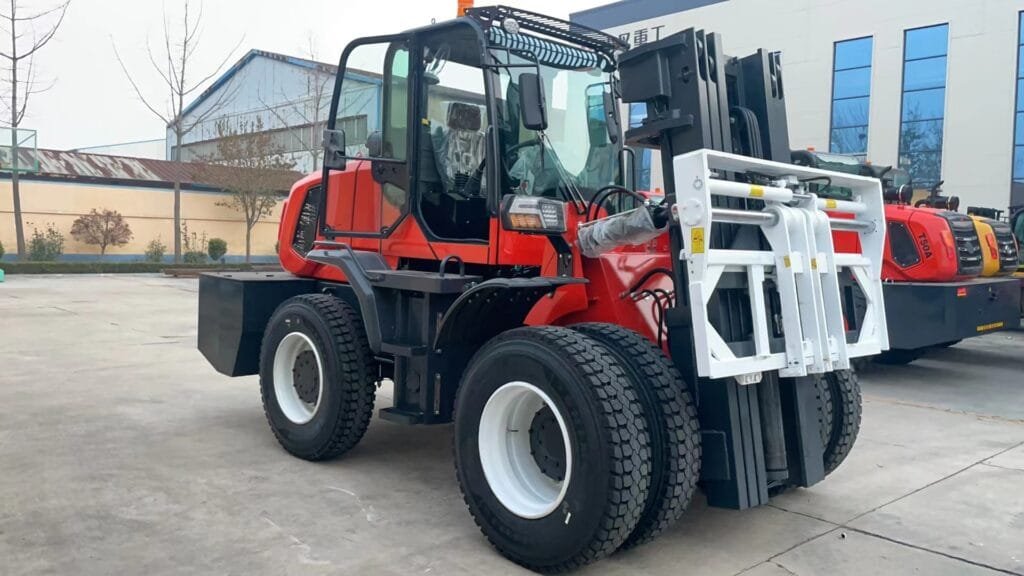
Why China Has Become a Leading Hub for Forklift Manufacturing
Cost-Competitive Production
One of the most compelling reasons global buyers turn to China is competitive pricing. Thanks to well-established supply chains, access to raw materials, and lower labor costs, Chinese manufacturers can produce forklifts for a fraction of the price of Western brands — without necessarily compromising quality.
Expanding Export Capabilities
Today’s leading Chinese forklift makers have dedicated export departments, bilingual sales teams, and partnerships with international freight forwarders. This makes the buying process smoother, even for first-time importers.
Government Support for Heavy Machinery Industries
The Chinese government actively supports heavy equipment production with tax incentives, subsidies, and research grants. This investment fuels technological development and enables manufacturers to upgrade their facilities.
Understanding Rough Terrain Forklifts
Definition and Key Features
A rough terrain forklift differs from standard warehouse forklifts in its ability to operate on uneven, soft, or sloped ground. Some of the key features include:
- Large pneumatic tires with deep treads for better traction
- High ground clearance to avoid obstacles
- Powerful diesel or LPG engines for torque and lifting capacity
- Robust frames built to withstand heavy-duty use
Applications Across Different Industries
They are commonly used in:
- Construction – Transporting bricks, steel beams, and concrete forms
- Agriculture – Moving feed, hay bales, and farm equipment
- Lumber operations – Handling logs and timber in outdoor yards
- Military and disaster relief – Delivering supplies in remote or damaged areas
Performance Requirements for Challenging Environments
In rugged conditions, performance depends on:
- Load stability – Preventing tipping during uneven travel
- Engine torque – Maintaining power on slopes
- Maneuverability – Navigating narrow or obstructed paths
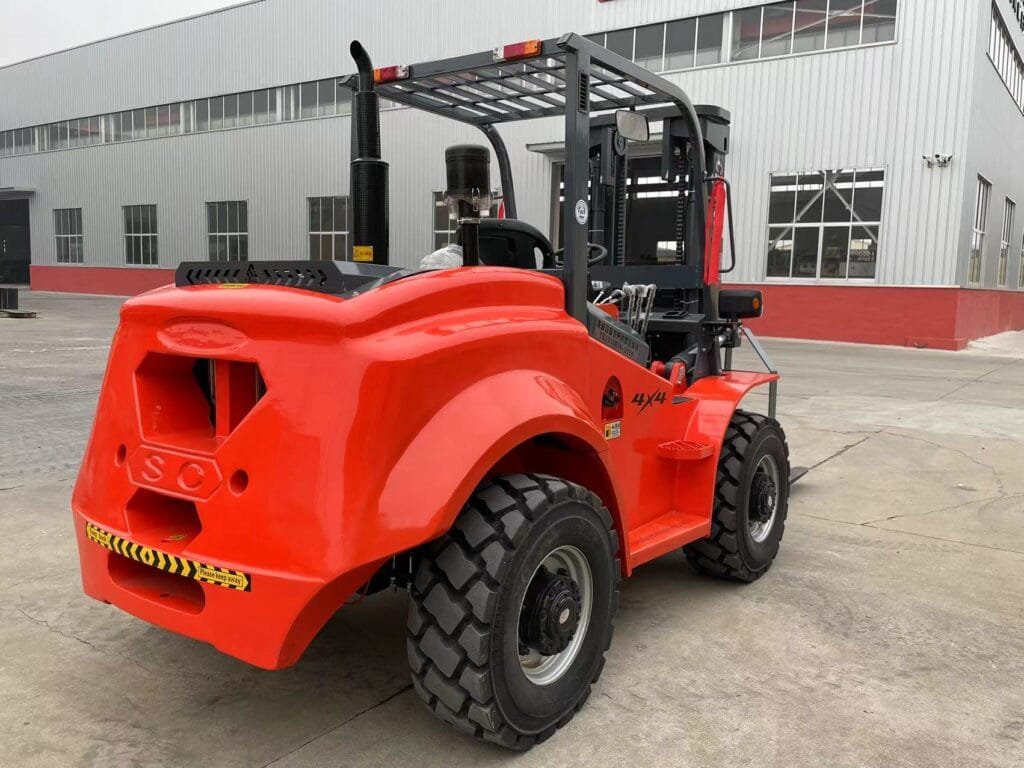
Key Factors to Evaluate When Choosing a Manufacturer
1. Manufacturing Experience and Specialization
An experienced manufacturer is more likely to produce consistent, high-quality products. If a company has been producing forklifts for over 10 years, it shows they’ve had time to refine their designs and production processes.
2. Product Quality and Compliance Standards
Inspect whether the manufacturer:
- Uses certified steel and components
- Has a quality control process at each production stage
- Adheres to ISO 9001 quality management systems
3. Innovation and Technology Integration
Top-tier manufacturers invest in:
- Advanced hydraulic systems for smoother operation
- Telematics and fleet management software
- Ergonomic cabins to reduce operator fatigue
4. Range of Models and Customization Options
Look for flexibility in:
- Load capacity (e.g., 2.5 tons, 3.5 tons, 5 tons)
- Mast height and lift range
- Fuel options (diesel, LPG, electric hybrids)
5. Supply Chain and Production Capacity
Ask about:
- Monthly production output
- Ability to handle bulk orders
- Partnerships with reputable parts suppliers
6. Customer Support and After-Sales Service
A forklift is a long-term investment. Ensure the manufacturer:
- Offers training for operators
- Has a spare parts inventory
- Provides technical support in your language
7. Warranty and Parts Availability
Longer warranties (1–2 years) show confidence in product durability. Also, check how quickly spare parts can be shipped to your location.
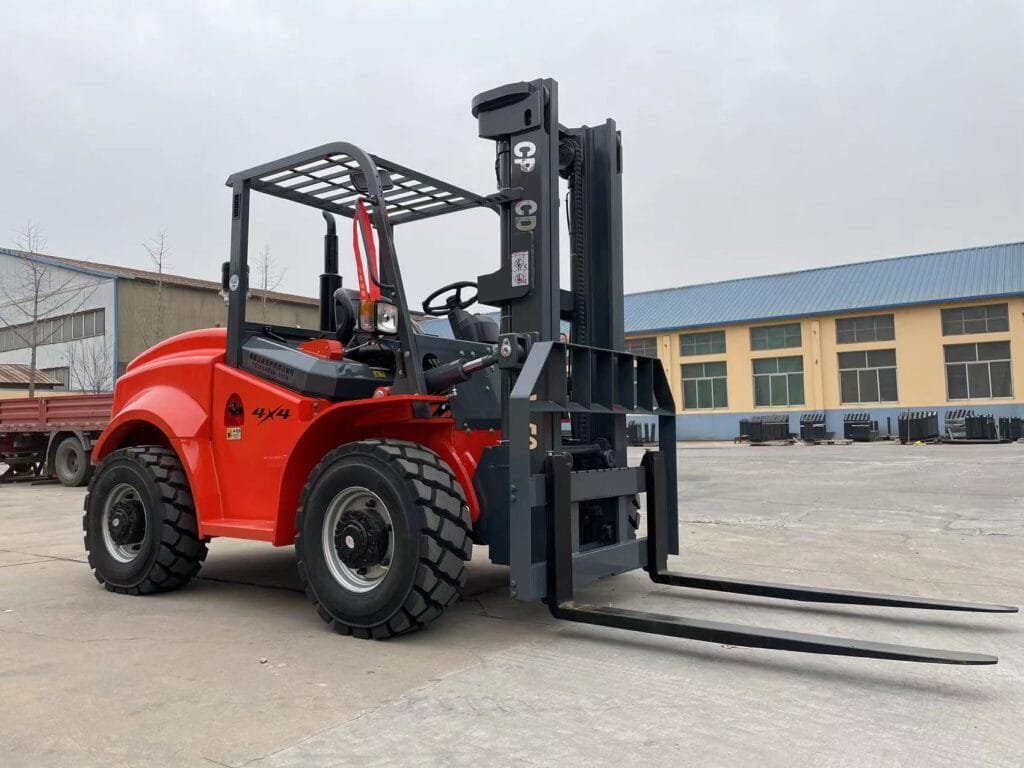
Certification and Compliance Requirements
ISO Certifications
An ISO-certified manufacturer demonstrates commitment to systematic quality control.
CE Marking and International Safety Standards
If you operate in Europe, CE compliance is a must. North American buyers should look for ANSI or CSA certification.
Environmental and Emission Compliance
For diesel forklifts, compliance with EPA Tier 4 or Euro Stage V emission standards is essential.
Conducting Due Diligence on Chinese Manufacturers
Factory Audits and On-Site Visits
If possible, visit the manufacturer’s factory to:
- Verify production capacity
- Inspect assembly lines
- Meet engineers and managers
Reviewing Customer Feedback and Case Studies
Ask for references from previous buyers. Check whether the machines performed well in real-world conditions similar to yours.
Third-Party Inspection Services
Companies like SGS, TÜV, and Bureau Veritas can inspect forklifts before shipment.
Common Pitfalls to Avoid When Sourcing from China
Overlooking Quality in Favor of Low Price
Ultra-low prices may mean cheaper materials or weaker components.
Ignoring Intellectual Property Protection
If you’re ordering a custom design, register trademarks and patents to prevent imitation.
Not Accounting for Shipping and Import Costs
Consider freight, port fees, customs duties, and inland transportation.
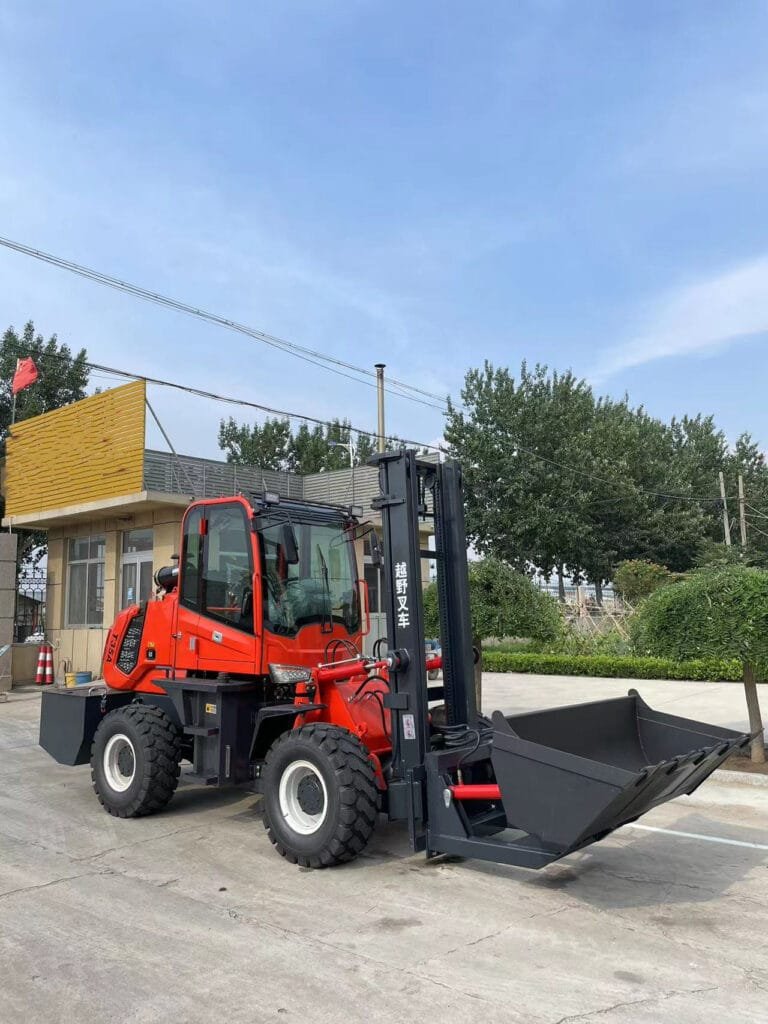
Why Nicosail Stands Out as an Example of Best Practices
While there are many manufacturers in China, Nicosail demonstrates several qualities that align with best practices for sourcing forklifts.
Proven Track Record in Rough Terrain Forklifts
Nicosail has experience supplying machinery to varied markets — from construction firms in Asia to agricultural enterprises in Africa.
Emphasis on Quality and Compliance
Their equipment meets ISO and CE standards, giving international buyers confidence in durability and safety.
Strong Export Support and Customer Service
With dedicated export teams, multilingual staff, and clear documentation processes, they simplify international transactions.
Negotiating Terms and Building a Long-Term Partnership
Payment Terms and Trade Assurance
Use secure payment methods or platforms offering buyer protection.
Setting Clear Quality Benchmarks
Agree on written specifications, including load capacity, engine type, and safety features.
Establishing Ongoing Communication Channels
Regular video calls, production updates, and milestone reports prevent misunderstandings.
Extended Final Checklist Before Placing an Order
- Technical Review – Match machine specs to operational needs
- Compliance Verification – ISO, CE, or ANSI certification confirmed
- Parts Support – Availability and shipping timelines for spares
- Warranty Terms – Length, coverage, and exclusions
- Shipping Logistics – FOB vs CIF terms, freight timelines
- Inspection Approval – Pre-shipment quality check
- Payment Security – Trade assurance or letter of credit
Case Study: Successful Forklift Sourcing
A construction firm in South America needed 15 rough terrain forklifts for a large infrastructure project. After evaluating several suppliers, they chose a Chinese manufacturer similar in approach to Nicosail:
- Conducted a factory visit
- Verified CE compliance
- Negotiated a two-year warranty
- Received training for local operators
Result: Zero major breakdowns in the first year and significant cost savings compared to local sourcing.
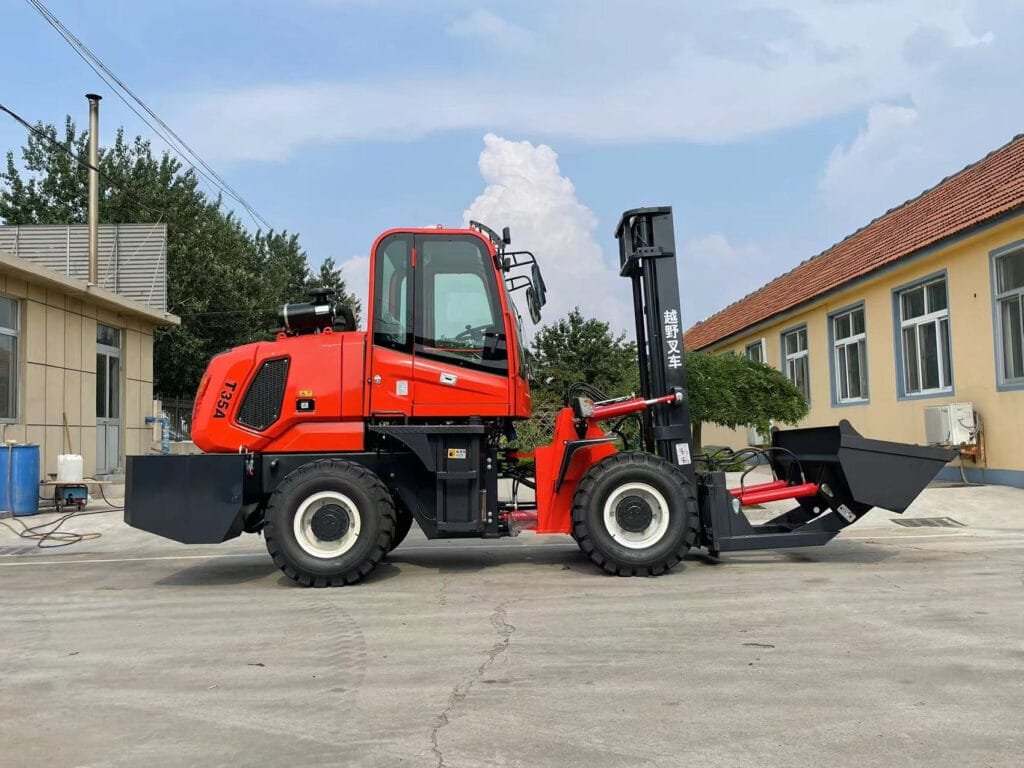
FAQs About Vetting Rough Terrain Forklift Manufacturers in China
1. How can I verify a manufacturer’s legitimacy?
Check licenses, verify registration on government portals, and use third-party audits.
2. What’s the average price of a rough terrain forklift from China?
Depending on specifications, prices range from $12,000–$35,000.
3. Is it possible to order just one unit?
Yes, many manufacturers accept MOQ of 1–3 units.
4. How long does shipping take?
Typically 30–45 days for sea freight.
5. Can I customize branding?
Yes, most manufacturers offer OEM and private labeling.
6. Should I use an agent?
An agent can help, but direct communication often leads to better pricing.
Conclusion: Making a Confident Choice
Sourcing a rough terrain forklift from China can save you money and time, but only if you vet the manufacturer thoroughly. By focusing on quality, compliance, service, and transparency, you can minimize risks.
Brands like Nicosail show that it’s possible to find a reliable, export-ready partner in China who can deliver durable equipment and support long-term operations. The key is due diligence — research, verify, and communicate until you’re confident in your choice.


